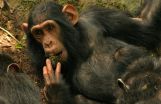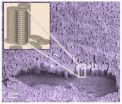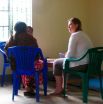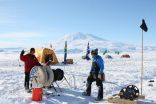(Press-News.org) Evidence of new behaviour being adopted and transmitted socially from one individual to another within a wild chimpanzee community is publishing on September 30 in the open access journal PLOS Biology. This is the first instance of social learning recorded in the wild.
Scientists from University of St Andrews, University of Neuchâtel, Anglia Ruskin University, and Université du Quebec studied the spread of two novel tool-use behaviours among the Sonso chimpanzee community living in Uganda's Budongo Forest. Dr Catherine Hobaiter, Lecturer in Psychology at the University of St Andrews, said: "researchers have been fascinated for decades by the differences in behaviour between chimpanzee communities; some use tools some don't, some use different tools for the same job. These behavioural variations have been described as 'cultural', which in human terms would mean they spread when one individual learns from another; but in most cases they're long established and it's hard to know how they originally spread within a group. We were incredibly lucky to be in the right place at the right time to document the appearance and spread of two novel tool-use behaviours, something that is extraordinarily rare in the wild."
The researchers investigated the spread of new variations of 'leaf-sponges', which are tools dipped in water to drink from, commonly manufactured by the Sonso chimpanzees by folding leaves in their mouth. Different individuals were observed to develop two novel variants: moss-sponging (a sponge made of moss or a mixture of leaves and moss) and leaf-sponge re-use (using a sponge left behind on a previous visit). Neither moss-sponging nor leaf-sponge re-use had been previously observed in Sonso in over twenty years of continuous observation. Chimpanzees are widely considered to be the most 'cultural' of all non-human animals, but most studies examining how behaviour is transmitted are carried out in captive groups. This has long been a focus for critics of arguments for chimpanzee culture, who point out that without similar evidence from the wild it is difficult to argue for an evolutionary connection between human and chimpanzee 'culture'. Here, for the first time, researchers tracked in real time how a new natural behaviour was passed from individual to individual in a wild community. Dr William Hoppitt, Senior Lecturer in Zoology at Anglia Ruskin University said: "Our results provide strong evidence for social transmission along the chimpanzees' social network, demonstrating that wild chimpanzees learn novel tool-use from each other and support the claim that some of the observed behavioural diversity in wild chimpanzees should be interpreted as 'cultural'."
The analysis began when Nick, the 29-year-old alpha male chimpanzee, made a moss sponge while being watched by Nambi, a dominant adult female. Over the next six days a further seven individuals made and used moss sponges. Six of these had observed the behaviour before adopting it and the seventh was seen to re-use a discarded moss sponge so may have learned about the novel behaviour in this way. The scientists also recorded a 12-year-old sub-adult male retrieve and use a discarded leaf sponge. A further eight individuals adopted the re-use technique, but only four of them observed another individual re-using a sponge first. By using a technique called network-based diffusion analysis the researchers estimated that each time a 'naïve' chimpanzee observed moss-sponging, this individual was 15 times more likely to develop the behaviour. This striking effect contrasted with the re-use behaviour in which social learning played much less of a role.
The study indicates that group-specific behavioural variants in wild chimpanzees can be socially learned, adding to the evidence that this prerequisite for culture originated in a common ancestor of great apes and humans, before the advent of modern humans. Dr Thibaud Gruber, Marie Curie Fellow at the University of Neuchâtel, said: "This study tells us that chimpanzee culture changes over time, little by little, by building on previous knowledge found within the community. This is probably how our early ancestors' cultures also changed over time. In this respect, this is a great example of how studying chimpanzee culture can help us model the evolution of human culture. Nevertheless, something must have subsequently happened in our evolution that caused a qualitative shift in what we could transmit, rendering our culture much more complex than anything found in wild apes. Understanding this qualitative jump in our evolutionary history is what we need to investigate now."
INFORMATION:
Chimpanzee Tool Use:
http://youtu.be/G0nCXYZ4w0U
Chimpanzee Tool Use Continued
http://youtu.be/kbR7vF6uXPc
Please mention PLOS Biology as the source for this article and include the links below in your coverage to take readers to the online, open access articles
All works published in PLOS Biology are open access, which means that everything is immediately and freely available. Use this URL in your coverage to provide readers access to the paper upon publication:
http://www.plosbiology.org/article/info:doi/10.1371/journal.pbio.1001960
Contact:
Thibaud Gruber
thibaud.gruber@gmail.com
Citation: Hobaiter C, Poisot T, Zuberbühler K, Hoppitt W, Gruber T (2014) Social Network Analysis Shows Direct Evidence for Social Transmission of Tool Use in Wild Chimpanzees. PLoS Biol 12(9): e1001960. doi:10.1371/journal.pbio.1001960
Funding: We are grateful to the Royal Zoological Society of Scotland for providing core funding for the Budongo Conservation Field Station. The fieldwork of CH was funded by the Leverhulme Trust, the Lucie Burgers Stichting, and the British Academy. TP was funded by the Canadian Research Chair in Continental Ecosystem Ecology, and received computational support from the Theoretical Ecosystem Ecology group at UQAR. The research leading to these results has received funding from the People Programme (Marie Curie Actions) and from the European Research Council under the European Union's Seventh Framework Programme (FP7/2007) REA grant agreement nu329197 awarded to TG, ERC grant agreement nu 283871 awarded to KZ. WH was funded by a BBSRC grant (BB/I007997/1). The funders had no role in study design, data collection and analysis, decision to publish, or preparation of the manuscript.
Competing Interests: The authors have declared that no competing interests exist.
Study shows how chimpanzees share skills
2014-09-30
ELSE PRESS RELEASES FROM THIS DATE:
Boys and girls who've had a traumatic brain injury differ in rates of harmful behavior
2014-09-30
TORONTO, Sept. 30, 2014 – Teenagers who said they had a traumatic brain injury in their lifetime, especially girls, also reported significantly higher rates of harmful behavior, according to new research.
The study looked at 13 harmful health behaviours –such as contemplating suicide, smoking marijuana or binge drinking– among 9,288 Ontario students between Grades 7 and 12.
"Both boys and girls were more likely to engage in a variety of harmful behaviours if they reported a history of TBI, but girls engaged in all 13 harmful behaviours we looked for, whereas boys were ...
Blades of grass inspire advance in organic solar cells
2014-09-30
AMHERST, Mass. – Using a bio-mimicking analog of one of nature's most efficient light-harvesting structures, blades of grass, an international research team led by Alejandro Briseno of the University of Massachusetts Amherst has taken a major step in developing long-sought polymer architecture to boost power-conversion efficiency of light to electricity for use in electronic devices.
Briseno, with colleagues and graduate students at UMass Amherst and others at Stanford University and Dresden University of Technology, Germany, report in the current issue of Nano Letters ...
Comprehensive Study of allergic deaths in US finds medications are main culprit
2014-09-30
September 30, 2014—(BRONX, NY)—Medications are the leading cause of allergy-related sudden deaths in the U.S., according to an analysis of death certificates from 1999 to 2010, conducted by researchers at Montefiore Medical Center and Albert Einstein College of Medicine of Yeshiva University. The study, published online today in the Journal of Allergy and Clinical Immunology, also found that the risk of fatal drug-induced allergic reactions was particularly high among older people and African-Americans and that such deaths increased significantly in the U.S. in recent ...
The cultural side of science communication
2014-09-30
EVANSTON, Ill. --- Do we think of nature as something that we enjoy when we visit a national park and something we need to "preserve?" Or do we think of ourselves as a part of nature? A bird's nest is a part of nature, but what about a house?
The answers to these questions reflect different cultural orientations. They are also reflected in our actions, our speech and in cultural artifacts.
A new Northwestern University study, in partnership with the University of Washington, the American Indian Center of Chicago and the Menominee tribe of Wisconsin, focuses on science ...
Rating the planet's oceans
2014-09-30
The most comprehensive assessment conducted by the Ocean Health Index rates the Earth's oceans at 67 out of 100 in overall health. In addition, for the first time, the report assessed the Antarctic and the 15 ocean regions beyond national jurisdiction (high-seas areas) — all critical regions for maintaining a healthy climate, safeguarding biodiversity and providing sustainable food sources.
In the third annual update of the index, a partnership led by scientists from UC Santa Barbara's National Center for Ecological Analysis and Synthesis (NCEAS) and Conservation International ...
New diagnostic approach for autism in Tanzania
2014-09-30
PROVIDENCE, R.I. [Brown University] — Autism is no stranger to the children of Tanzania. What is rare in the East African nation is access to clinical services, including reliable diagnosis and evidence-based treatments. There is no autism diagnostic measure, for example, validated for use in Swahili, a major language of the region. In a small new study, however, researchers at Brown University and the University of Georgia (UGA) describe a culturally compatible diagnostic approach that they implemented at two sites in the country and found to be effective for making diagnoses.
The ...
This week from AGU: Measuring Antarctic ice loss, Indian Ocean program, Oregon landslides
2014-09-30
This week from AGU: Measuring Antarctic ice loss, Indian Ocean program, Oregon landslides
From AGU's blogs: Scientists use fiber-optic cables to measure ice loss in Antarctic
Researchers installed moorings containing fiber-optic cables hundreds of meters down into the McMurdo Ice Shelf in West Antarctica to collect temperature information about the base of the ice shelf, where the thick platform of floating ice meets the ocean. The sensors were able to measure mere millimeters of ice loss at the interface, demonstrating that the new fiber-optic method could be ...
Depression increasing across the country
2014-09-30
SAN DIEGO, Calif. (Sept. 30, 2014)— A study by San Diego State University psychology professor Jean M. Twenge shows Americans are more depressed now than they have been in decades.
Analyzing data from 6.9 million adolescents and adults from all over the country, Twenge found that Americans now report more psychosomatic symptoms of depression, such as trouble sleeping and trouble concentrating, than their counterparts in the 1980s.
"Previous studies found that more people have been treated for depression in recent years, but that could be due to more awareness and less ...
Disease decoded: Gene mutation may lead to development of new cancer drugs
2014-09-30
ANN ARBOR—The discovery of a gene mutation that causes a rare premature aging disease could lead to the development of drugs that block the rapid, unstoppable cell division that makes cancer so deadly.
Scientists at the University of Michigan and the U-M Health System recently discovered a protein mutation that causes the devastating disease dyskeratosis congenita, in which precious hematopoietic stem cells can't regenerate and make new blood. People with DC age prematurely and are prone to cancer and bone marrow failure.
But the study findings reach far beyond the ...
New guidelines for treatment of hypothyroidism endorse current therapy
2014-09-30
WASHINGTON (Sept. 30, 2014) — Levothyroxine is considered the gold standard therapy for an underactive thyroid gland (hypothyroidism), and a new review of therapies for the condition — including combining levothyroxine with another agent — has not altered that assessment, say a team of investigators.
1Their analysis, published as a set of guidelines in the journal Thyroid, finds insufficient consistent data exist to recommend a change in use of levothyroxine — whether generic, or sold under various trade names, such as Synthroid® — as the only drug needed to treat hypothyroidism.
"Levothyroxine ...




